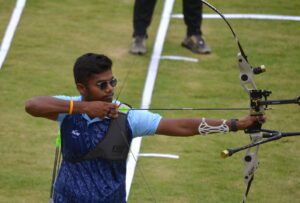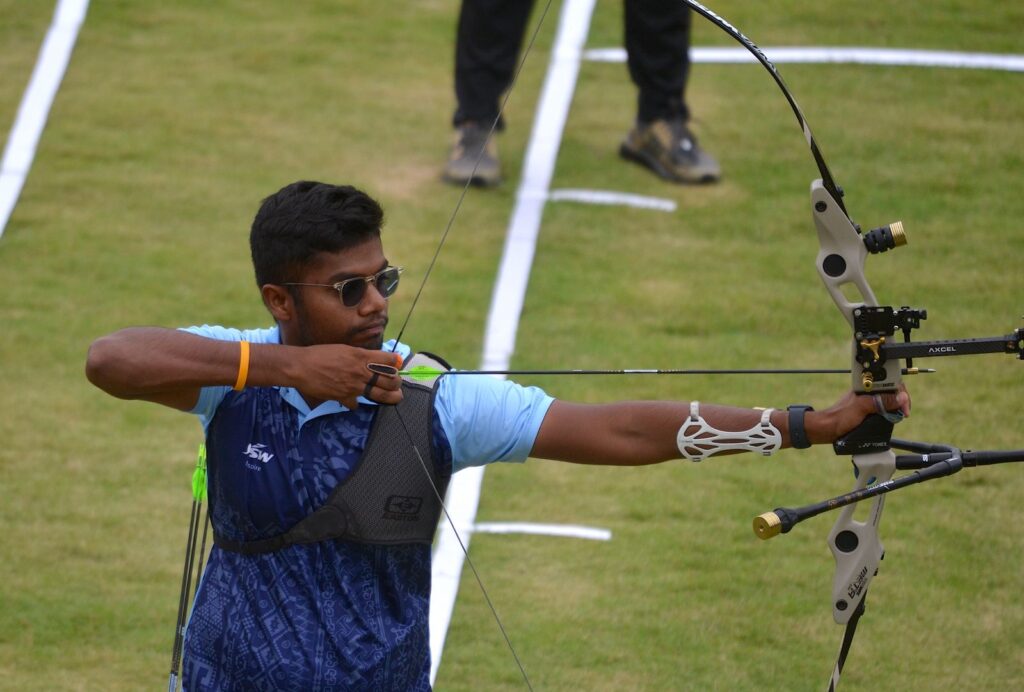
Recurve archer B Dhiraj’s qualification for next year’s Olympic Games in Paris by making it to the final of the Asian Continental Qualifying Tournament in Bangkok last week came as a whiff of fresh air. But it cannot hide the disappointment of the men’s team not being able to secure the quota in the Asian Championships which concluded a couple of days earlier.
Viewed from the Olympic perspective, it is natural that Recurve teams come under the scanner. It is not the half-full-or-half-empty approach that can be taken in this instance. Yet, by letting the brilliance of the Compound teams overshadow the Recurve failures, one is missing the woods for the trees. The Compound archers’ success can never paper over the Recurve-bow cracks.
Indian Recurve teams missed the bus in July 2023 when the top three men and women’s teams at the World Archery Championships were able to book berths for Paris 2024. With South Korea and Japan men already having qualified in Berlin, the Indian men’s team should have gunned for the one quota spot available at the Asian Championships in Bangkok.
Such a prospect was based on the fact that India won silver behind South Korea in the Asian Games. However, in the Asian Championships, Dhiraj, Pravin Jadhav and Tarundeep Rai lost the quarterfinal to Kazakhstan 4-5 via the tiebreaker. Kazakhstan did not look back and went on to win the semifinal against Chinese Taipei to punch their tickets to Paris.
From a distance, it is clear that after India overcame a 2-4 deficit to tie the scores and extend the contest into the tiebreaker, it was a question of each of the archers holding his nerve and producing his best. The scorecard does not show emotions, but reveals that while one shot an inner 10, another managed a 9 while the third hit an 8.
In its wisdom, the Archery Association of India (AAI) conducted a selection trail to select the squad for the Asian Championships and the Asian Continental Quota event in Bangkok. The trial was held in Sonipat within a week of the Asian Games. It meant that the squad that won the Asian Games silver – Dhiraj, Atanu Das and Tushar Shelke – was dismantled and a new combination competed in Bangkok.
The whispers from within the corridors of AAI suggest that its high-performance leadership believes that Indian archers tend to relax after attaining qualification for a competition, and are not at their competitive best in the big-ticket event itself. And that it believes that Indians will make history by winning two medals in Paris 2024.
Are the top guns attempting reverse psychology when they say it is just as well that none of the Indian teams – men, women and mixed — did not win a quota place for Paris 2024? Do they really believe that the Indian mindset allows complacency to set in once qualification is achieved? And are they convinced that the teams can secure quotas in June 2024 and then medal in July-August?
At Tokyo2020, India was represented by four archers – Deepika Kumari and the men’s trio of Atanu Das, Pravin Jadhav and Tarundeep Rai. Each of them achieved the quotas in 2019, several months before the Covid-19 pandemic swept the world and threw life in a disarray. To surmise that these archers took the foot off the pedal after securing those quotas is misplaced.
From Limba Ram’s time in the 1980s, Indian archers have raised hopes of doing something special in the Olympic Games but have yet to earn a podium finish. It is time for the gap between potential and performance to be bridged. Dhiraj, who missed out narrowly on competing in Tokyo, must learn from the experiences of his predecessors and chart his own route.
The AAI high-performance leadership must quickly introspect on what it can do better to make its own promise of two Olympic medals in 2024 come true. It can choose to bask in the glory of the Compound archers doing well in all competitions, or wake up to the reality that the Recurve group needs a fresh breath of life.
First, it must stop believing that Indian archers take a laidback approach after securing quotas and stop guaranteeing medals even before qualification has been achieved. All it needs to do it look at similar disciplines like shooting and see how no shooter is complacent in the run-up to the global competitions.
One of things that AAI can revisit is its decision to conduct trials ahead of all major meets. Going by current trends, it should surprise no one if the AAI high performance calls for trials between the Final Qualifier in Antalya, Turkey, and Paris. The other things that must be done is to examine the frequency of the trials and tweak the manner in which they are conducted.
Indeed, if the AAI high-performance leadership needs an external audit on the processes, they must not hesitate to initiate that. For, India’s Recurve archery has appeared to be running on a treadmill for many years now and needs to change its approach to global competitions.
That may be the catalyst that can stop Olympic archery medals from being a mere mirage.




